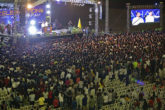
Many Christians kicked off the lenten season on Wednesday, 6 March, however some theologians are drawing attention to the fact that the practice of fasting might be waning because many believers have never been taught why it’s necessary or even how to do it.
Renown author Jennifer Eivaz, whose latest book, Glory Carriers: How to Host His Presence Every Day, was released earlier this week has told journalists she believes that many Christians, especially those who do not fast, have simply never had solid teaching on it and leaders have not called people to fast.
According to Eivaz, scripture is replete with examples of prophets, speaking for God, both calling people to and teaching them how to do it.
“When Jesus spoke to His disciples and He asked them some questions in connection to the Lord’s prayer, He didn’t just ask them questions, He made some very clear statements. And He said ‘when’ you pray, and then He said, ‘when’ you fast,” Eivaz told The Christian Post.
“When you are fasting, and that is in connection with prayer, too many people don’t realize that you are making your own physical body a sacrifice and when you do that you are literally in a continuous prayer. Just because you may not be verbalizing something in the moment, that act alone is a continuous prayer,” she added.
Donald Whitney, a professor of biblical spirituality and associate dean of the School of Theology at The Southern Baptist Theological Seminary in Louisville, Kentucky backed Jennifer Eivaz’s remarks saying people are not going to do what they have not been taught to do.
“Fasting appears in the Bible more often than something as important as baptism,” he said, “by my count, about 77 times or so, fasting is mentioned versus 75 times for baptism.”
“It’s hard to be an advocate for something from the pulpit you’re not doing,” Whitney said. “It’s hard to get up to urge people to fast if you’re not fasting. The same is true for family worship or any other practice.” he explained.
According to the Christian Post, Whitney went on to explain that there are many purposes to fasting, but the most common one is to strengthen prayer.
For fasting to be done right, there must be a biblical purpose, he emphasized.
If not done with such a purpose, it will only be something to endure.
“It’s not the church’s idea, it’s not some historical figure’s idea, it’s God’s idea,” Whitney told the Christian Post, adding that “we don’t manipulate God by doing it and we don’t gain anything necessarily by doing it.”
“If, when you get hungry and your stomach growls and your head aches and you say, ‘Man, I’m hungry,’ and your next thought is ‘Oh, that’s right, I’m fasting today,’ and then your next thought is ‘How long until this is over?’ you’re doing it wrong.” Whitney stressed.
“Your hunger serves your larger purpose,” Whitney reiterated, “and without that it is just something to be endured and we think that we are impressing God by making ourselves suffer and somehow that earns us points. That’s just a works-based, not Gospel-based view of fasting. And that’s probably the most common mistake by those who do fast.”

